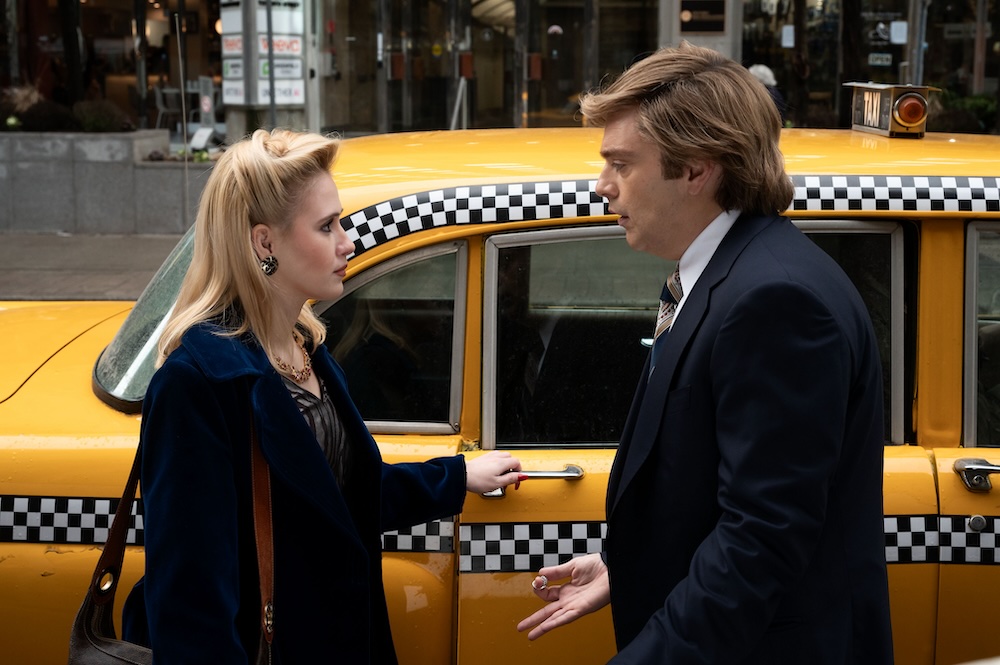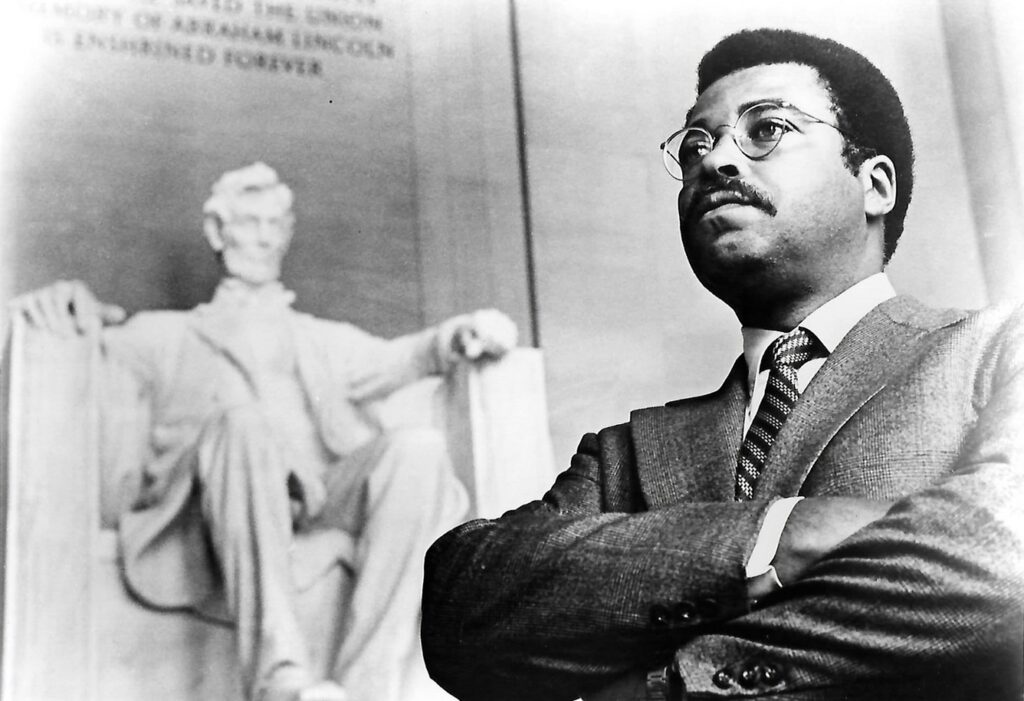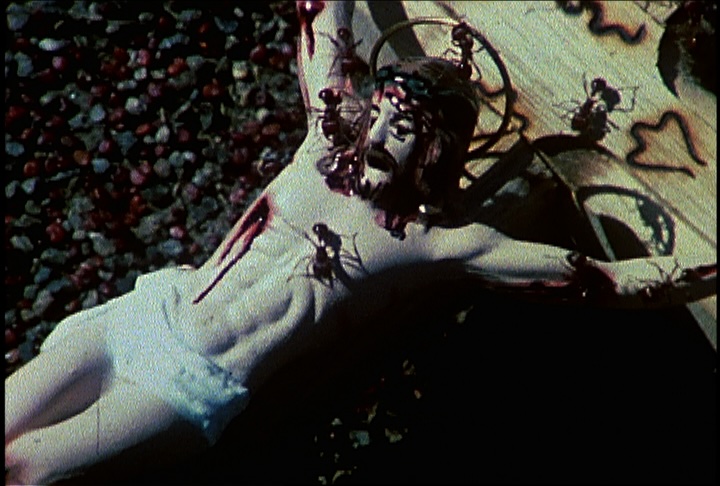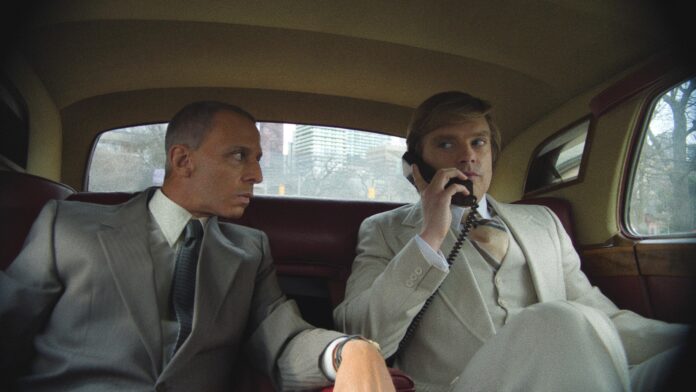Men and power seem an apt theme with Halloween coming up, not to mention a potentially much scarier occasion a few days later. Many a highly fictive horror movie these days starts with the nearly-obligatory “based on a true story” that is genuinely applicable to The Apprentice, a movie that reportedly had to fundraise to self-release because no distributor had the cajones to risk its real-life subject’s wrath. That subject has also threatened to sue the filmmakers, though a.) he does that with everybody, b.) apparently everything onscreen was vetted by umpteen lawyers first.
Of course the people who would probably most benefit from seeing Ali Abbasi’s feature most likely won’t, having heard it doesn’t flatter him and thus dismissible as “fake news.” Still, this latest from the Iranian-Danish maker of two very good prior narratives (resonant fantasy Border, Iran-set true crime Holy Spider) is better than you might expect, and not as inflammatory as some might assume. It does have shocking moments (notably an instance of marital rape that Wife #1 claimed, then semi-retracted), sleazy behavior and plentiful gutter language insulting towards the expected demographics. But one suspects what would really tee The Donald off if he were to give it a watch are more subtly damning aspects, like the notion that he was ever an insecure bumbler in need of mentoring…or that fundamental ideas he claimed as his own invention might have been cribbed whole from a sharper mind.
That mind belongs to Roy Cohn, one of the great villains of 20th century American life—a closeted gay homophobe, anti-Semitic Jew, goading toady to red-baiter Joseph McCarthy, and ever so much more. It is something that nearly 40 years after his demise (from AIDS, which he denied to the bitter end), amidst unprecedented conservative anti-democratic skullduggery, Cohn remains the gold standard for corruption in the intersection between litigation and politics. He held such sway in NYC, he managed not to get disbarred until mere weeks before his death.
He is played here here with dead-eyed reptilian conviction by Jeremy Strong, who’ll surely get an Oscar nomination… unless Hollywood is just too terrified in a few months. More low-key is the achievement of Sebastian Stan, who just played another transformative role in the exceptional A Different Man (reviewed here). Here, he starts out as a doughy, dopey early 1970s Trump, desperate to prove himself to his boorish real-estate magnate father (an unrecognizable Martin Donovan), not exactly sympathetic but not yet detestable. Donald wants to “take New York” at its nadir of white flight, insolvency, and crime, in order to “bring it back” to some glamorous past newly outfitted in chrome and disco balls. But no one is impressed by his development schemes until he comes under the tutelage of Cohn, who might first be attracted to the blonde chicken (not that Don’s heterosexual bona fides are questioned), but then recognizes an incubating fellow snake of yuuuge promise.

Accompanied by numerous ultracheesy Me Decade pop hits, these two stroke each other’s egos—Junior is duly awed by such Cohnvictions as “Everybody wants to suck a winner’s cock,” while ye olde troll gets to sculpt a ruthless capitalist monster more media-friendly than he could ever be himself. En route, palms are greased and officials blackmailed; at a party, cultural ignoramus Don asks Andy Warhol “So what do you do?”; he woos emigre Czech model Ivana (Marina Bakalova); observes with modest regret the downfall of older brother Freddie (Charlie Carrick), then swindles his heirs out of their share in the family trust; opens Trump Tower, overreaches in Atlantic City. Journalist Gabriel Sherman’s screenplay ends as Trump is about to write (or rather have written for him) The Art of the Deal, Cohn’s convenient recent death having freed him to borrow that man’s life wisdoms sans accreditation. Among the dramatized figures making just cameo appearances are Roger Stone, Ed Koch, Rupert Murdoch, and various mobsters.
Of course some of this must be speculation. But given that more lurid things come out of the aspiring autocrat’s mouth every day now, it is mostly remarkable how sensationalized in feel The Apprentice—named after guess-who’s defining reality TV series, natch—isn’t. It has nudity, glimpses of orgies, even gore (albeit of a cosmetic-surgical type), yet the overall vibe is surprisingly nuanced. By the end, Stan is channeling something close to the persona we can’t escape, the endlessly needy blowhard who can’t hear anyone else talking.
If the early going manages to make Trump seem almost relatable in comparison to the Nosferatu-esque Cohn, by fadeout there’s a certain pathos in the way that grotesquely blossoming student has surpassed the dying master—we can see how Trump no longer has enough empathy to mourn his own Svengali… just as he’d been taught. The Apprentice won’t likely change anybody’s mind on any relevant issues at this urgent moment in time. But it is more insightful and accomplished than one had any right to expect, given that your first thought on how Trump might be portrayed at the movies might more easily run towards Idiocracy 2—or maybe The Passion of the Christ, for all I know. The Apprentice opens in theaters nationwide Fri/11.

Speaking of unlikely presidencies, Movies for Maniacs is hosting a very rare theatrical revival that same night at the Balboa. Irving Wallace’s 1964 bestseller The Man was written when an African-American POTUS was almost unimaginable, and filmed eight years later when the social climate had changed… but only “somewhat.” (Of course it would take another 36 years for that to happen in real life.) Updated for an era of Vietnam protests, Rod Serling’s adaptation for director Joseph Sargent has James Earl Jones at his most sonorously dignified as Senator Douglass Dilman, who—though a series of sudden tragic events— suddenly assumes the highest office in the land. His activist daughter (Janet McLachlan) accuses him of being a “pedantic professor” who’s too “humble and apologetic” even in Congress. But when pushed around too much as a “temp” by those who’d seek to limit his power, he quickly learns to assertive himself.
The Man was made as an “ABC Movie of the Week,” then sent into theatrical release instead when advertisers apparently resisted the “controversial” subject matter. Jones and others lamented that shift, saying that the movie hadn’t been made for the big screen, where inevitably it looked and felt like a TV show. The mild tone inadvertently hands all excitement to villains: Burgess Meredith (as a fellow Senator who says things like “The White House doesn’t seem near white enough for me tonight”) and Barbara Rush (playing a Washington socialite poisonous enough to call Dilman “jigaboo”) steal scenes whole simply by getting to express some/any ugly underside to the nation’s power hierarchies.
This time-capsule curiosity is screening on 16mm in a tribute to the recently deceased Jones and to Serling, who will also represented by the 1959 pilot episode to legendary anthology series The Twilight Zone: “Where Is Everybody?,” with the excellent Earl Holliman as a soldier who wakes up in an unfamiliar town mysteriously void of all other inhabitants. Full info on the program is here.
The same year The Man came out, the “generation gap” got awkwardly if earnestly bridged one week when no less than John Lennon and Yoko Ono co-hosted The Mike Douglas Show, a popular afternoon talk-variety platform led by the titular former big-band singer. Having just moved to NYC post-Beatles-breakup, eagerly immersed in radical politics, the superstar counterculture couple wanted to show that “activism can be beautiful.” Thus their chosen guests during the week included Ralph Nader, Bobby Seale, Jerry Rubin, Asian-American protest singers Yellow Pearl, experts on biofeedback and macrobiotic cooking, etc. Plus Chuck Berry, George Carlin, The Chambers Brothers, Ace Trucking Company, and a few other pure (but very hip) entertainers.
The new documentary Daytime Revolution (which releases in theaters nationwide on Lennon’s birthday, Wed/9) recalls that singular quintet of episodes, in which Middle America watched Mike politely participate in Yoko’s show-and-tell-like art projects, in discussions about Women’s Lib and the Vietnam War, et al. It was a phenomenon at once amazing, brave, and pretty dull, with everyone on their best behavior. It is touching now to witness the faith with which so many in 1972 assumed war, poverty, sexism, consumerism and so forth must inevitably crumble before humanity’s newly evolved higher consciousness, despite all Nixonian pushback. Alas, history would move in a different direction—towards the likes of Donald Trump.

At one point in The Apprentice, that personage finds his limo stuck in an angry mid-’80s street protest against the government’s indifference towards the AIDS epidemic. Annoyed, he says “Run ‘em over”—just “joking,” kinda-sorta. SF Cinematheque at Counterpulse offers a different perspective on that moment with “In the Shadow of Forward Motion,” (more info here) a program of films by the late David Wojnarowicz—an artist in many media whose activist rage found most acute focus in addressing the epidemic that would kill him, too, at 37 in 1992.
The topicality and shock value of much of his work has tended to overshadow its frequent brilliance. (Will there ever be a major touring exhibition of his paintings?) The four shorts seen here provide just one window onto a diversely striking body of art. The brief, B&W 1981 Heroin is a glimpse of pre-AIDS life on the Manhattan margins; 1989’s ITSOFOMO preserves the sound and fury (with music by Ben Neill, and Wojnarowicz’s poetical narration) of what had been a live multidisciplinary performance. A Fire In My Belly and Unfinished film (sequence in memory of Peter Hujar) are permanently in-progress collages memorably riddled with apocalyptic, accusatory imagery that is hair-raising yet also undeniably beautiful.







